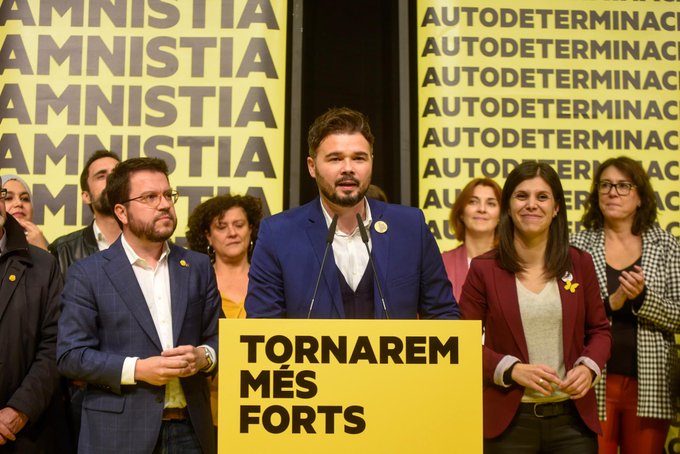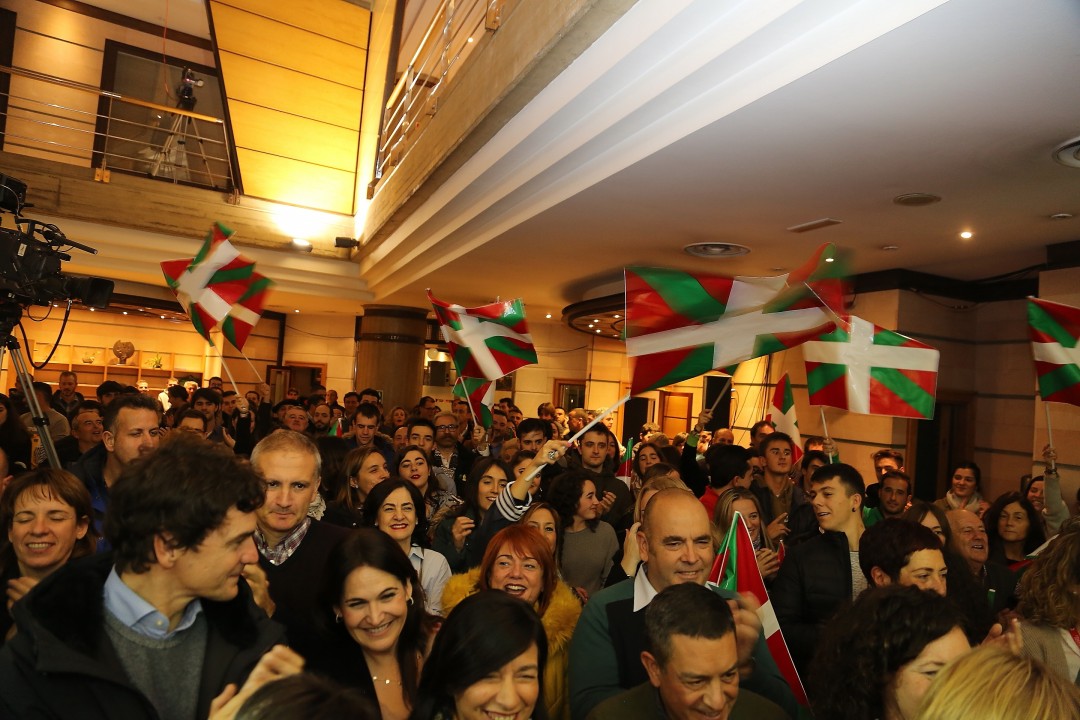News
Spanish general election: Catalan, Basque, Galician parties make gains
Number of sub-state parties in Congress grows to record high · PSOE wins most votes and seats, needs multiple deals to secure new term
A total of 49 seats will be held by sub-state parties or alliances, placed in very diverse political stances, ranging from anti-capitalism to the centre-right, and from support to independence from Spain to mild regionalism.
Political forces seeking to represent nations other than Spain, or demanding enlarged self-government for their territories, have obtained 46 seats in Congress: ERC 13, Junts per Catalunya 8, PNV 7, En Comú Podem 7, Bildu 5, Coalición Canaria 2, CUP 2, Compromís 1 and BNG 1. Below we will be introducing some clarifications to this list.
In addition, three regionalist parties have won seats: the Regionalist Party of Cantabria and Teruel Exists on their own, plus Asturias Forum in an alliance with PP.
Let us remember that, as regards Spanish-wide parties, centre-left PSOE won 120 seats, centre-right PP 87 (not including Forum Asturias), far-right Vox 52, left-wing Podemos 28 (not including En Comú Podem), centre-right Ciudadanos 10, Navarra Suma (a PP-Ciudadanos local alliance) 2, and left-wing Más País 2 (not including their Compromís allies).
Spain held a parliamentary election 7 months ago, on April 28, which was also won by the PSOE. But party leader and Spanish president Pedro Sánchez failed to reach an agreement to form a government, and the election was called again.
In order to secure another term, Sánchez has several options, all of them complex. PSOE could seek an agreement with Spanish left-wing parties and sub-state parties —Catalans and Basques are, by far, the ones with the most seats. Or it can also seek a deal with Podemos and/or other smaller forces and, at the same time, getting the PP to agree to abstain in the investiture vote. Another option is to try and forge a PSOE-PP grand coalition, which, however, the socialists say they reject.
Catalonia: pro-independence parties surpass 40% mark for the first time in Congress election
Pro-independence parties have achieved their best result in a Congress election, which traditionally were unfavourable to them. The three pro-independence forces (ERC, Junts per Catalunya and CUP, which ran for Congress seats for the first time) got a combined 42.6% of the votes, which earned them 23 of the 48 seats at stake in Catalonia. Seven months ago, it was 22 seats and 39.4% of the votes.
Centre-left ERC, with 13 seats, lost 2 compared to the 28-A result. Centrist Junts per Catalunya won 8 (up from 7 in April) while anti-capitalist CUP secured 2 seats.
 ERC leader in Barcelona Gabriel Rufián. / Photo: ERC
ERC leader in Barcelona Gabriel Rufián. / Photo: ERCBoth ERC and Junts yesterday called on Sánchez to form a government that is able to hold a political dialogue to solve the Catalonia-Spain conflict.
Left-wing En Comú Podem won 7 seats. This alliance is made up of Catalan party Catalunya en Comú, which holds views ranging from federalism to a certain confederalism, and Spanish party Podemos. Out of those 7 seats, 5 have gone to Catalunya en Comú members not having organic links with Spanish parties, while the other are held by one member of Podemos and another member of EUiA, which is linked to Spanish party United Left (IU).
Strength of Basque parties, failure of Spanish right wing
The two main Basque forces (centre-right PNV and centre-left pro-independence Bildu) improved their results for the second consecutive time. The PNV has once again been the party with the most votes (32%) and seats (7 out of a total of 18) in Euskadi, while Bildu has wom just under 19% and 4 seats. In addition, Bildu has won another seat in Navarre, which was not able to secure in April.
On the contrary, also in Navarre, Geroa Bai could not win a single seat after suffering a setback, as it fell from 6% of the votes in April to less than 4% now.
 People with Basque flags follow the election night with the PNV. / Photo: PNV
People with Basque flags follow the election night with the PNV. / Photo: PNVEuskadi is the only autonomous community where no party of the Spanish right (PP, Citizens and Vox) has captured one single seat. In Navarre, a PP and Citizens alliance (Navarra Suma) has been the largest, with 2 seats out of 5.
Galicia: BNG returns to Congress
One of the main features of the election in Galicia is the Bloque Nacionalista Gallego’s return to the Spanish Congress, after four years of being absent. The Galician pro-sovereignty party has obtained 8% of the votes in Galicia and one seat for the A Coruña constituency.
“The result greatly encourages us,” said BNG leader Ana Pontón, pointing to an upcoming Galician Parliament election to take place within 10 months at the most. The BNG will then seek to put an end to the government of Alberto Núñez Feijoo (PP) if the pro-sovereignty Galician party has enough seats combined with the PSOE and Podemos.
Compromís secures seat in Valencian Country
Centre-left Compromís —which this time ran in an alliance with a new left-wing Spanish party, Más País— has held the seat it had already won in April for the constituency of Valencia, this time reaching 7% of the votes in the whole of the Valencian Country.
Pro-independence Republican Left of the Valencian Country (ERPV, linked to ERC) has slightly improved its vote share (from 0.16% to 0.23%) but is far from any option of fighting for a seat.
Canary Islands: CC-NC joint venture does not provide 3rd seat
Unlike what happened in the April election, Canarian nationalist parties Coalición Canaria (CC) and Nueva Canarias (NC) have this time formed an alliance, seeking to join forces to get 3 seats —they had captured 2 seven months ago. Things did not go as they planned and, in fact, their joint venture obtained a lower share of vote (13%) than that obtained by the two parties separately in April (16%).
Three regionalist parties in Congress
The Regionalist Party of Cantabria (PRC) has again won one seat in the Congress, as it did seven months ago, while improving its vote share (14.5% then; 21% now). The PRC was the only party to sign an agreement with the PSOE to invest Sánchez.
Another regionalist list will be premiering in Congress: Teruel Existe, that arose from the citizens’ movement of the same name. They demand that Spanish authorities take measures against the depopulation of rural areas, and ask for investments in this province of Aragon. It has also won 2 seats in the Senate.
Finally, centre-right Asturias Forum, in an alliance with the PP, has also won a seat in the Congress.
